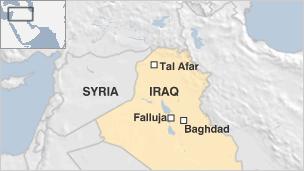Iraq intelligence academy chief Ali Aouni killed
- Published

The head of Iraq's intelligence academy and two bodyguards have been killed in a suicide blast in the northern town of Tal Afar, police say.
Gen Ali Aouni is believed to be the most senior Iraqi military officer to be killed this year.
Official sources told the BBC that the intelligence chief was not the intended target of the attackers.
Gen Aouni lived next door to another military figure in the town, who was unhurt in the explosion.
Two suicide bombers launched the attack on Saturday but one was shot dead by his neighbour's bodyguards, the BBC's Nahed Abuzeid reports.
As Gen Aouni emerged from his home, the second bomber, who had been wounded by the guards, detonated an explosives belt.
General Ali Aouni was head of the central college of military staff officers.
His neighbour Lt Habib Amin Ilias, who was described as a rapid response force commander, had been targeted before, our correspondent says.
Fallujah attack
No group has yet admitted carrying out the attack. But Tal Afar was a major battleground between US forces and Iraqi insurgents in 2005 and has since seen infrequent but bloody militant attacks.
The intelligence chief is the second prominent Iraq figure to be murdered so far this year, after an opposition member of parliament was killed in the city of Falluja in the western province of Anbar.
A bomber approached 37-year-old Sunni MP Eifan Saadoun al-Issawi last month and blew himself up, also killing two bodyguards.
Scores of people have been killed in a series of deadly attacks across Iraq since the start of the year.
Sunni insurgents linked to al-Qaeda have been blamed for much of the recent violence.
Tal Afar is located about 150km (90 miles) east of the Syrian border and 420km north-west of Baghdad.
Observers say the town, which has a mixed population of Sunni Arabs and Turkmen, is an area used by insurgents crossing the Syrian border in both directions.
Although sectarian violence has decreased in Iraq since the height of the insurgency in 2006 and 2007, attacks are still common.
Tensions have also been building up in the lead-up to parliamentary elections, due to be held in March.
Earlier this month, at least 33 people were killed and about 100 injured in a spate of car bombings in mainly Shia areas of Iraq, local officials said.
The attacks took place as thousands of Sunnis held protest rallies in several cities against the Shia-dominated government of Prime Minister Nouri Maliki, accusing him of monopolising power.
- Published15 January 2013